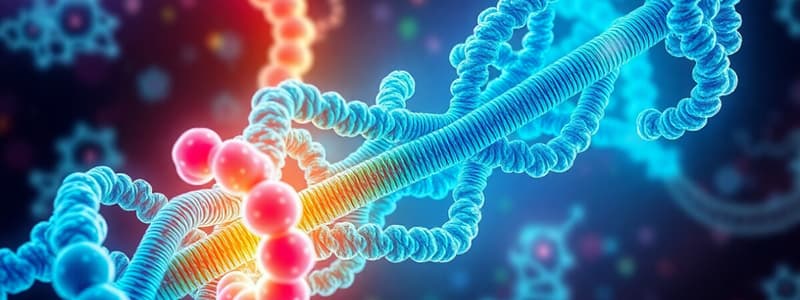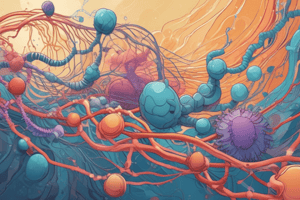Podcast
Questions and Answers
What is the primary function of mRNA in the cell?
What is the primary function of mRNA in the cell?
- It carries a portion of the DNA code to other parts of the cell. (correct)
- It acts as a messenger between organelles.
- It synthesizes proteins directly.
- It serves as a storage molecule for genetic information.
During which cellular process is mRNA synthesized?
During which cellular process is mRNA synthesized?
- Replication
- Transcription (correct)
- Translocation
- Translation
Why is mRNA larger than the protein it codes for?
Why is mRNA larger than the protein it codes for?
- As a result of the multi-step processing required for mRNA.
- Due to the presence of non-coding regions called introns. (correct)
- Because proteins are formed from smaller units than nucleotides.
- Because mRNA has a higher nucleotide weight than amino acids.
What does the wobble hypothesis refer to in genetics?
What does the wobble hypothesis refer to in genetics?
What is the main target of most antibiotics in prokaryotic cells?
What is the main target of most antibiotics in prokaryotic cells?
What role does the termination factor play during protein biosynthesis?
What role does the termination factor play during protein biosynthesis?
Which of the following is NOT an actor involved in the initiation phase of protein biosynthesis?
Which of the following is NOT an actor involved in the initiation phase of protein biosynthesis?
In the elongation phase of protein synthesis, which component is responsible for specifying the aminoacyl-tRNA?
In the elongation phase of protein synthesis, which component is responsible for specifying the aminoacyl-tRNA?
What component is essential for the hydrolysis of the polypeptide chain during termination?
What component is essential for the hydrolysis of the polypeptide chain during termination?
Which of the following factors is involved in moving tRNA during the elongation phase?
Which of the following factors is involved in moving tRNA during the elongation phase?
What is the role of the small subunit of the ribosome?
What is the role of the small subunit of the ribosome?
Which rRNA subunits are found in the large subunit of the ribosome?
Which rRNA subunits are found in the large subunit of the ribosome?
What sequence establishes contact between ribosomes and mRNA?
What sequence establishes contact between ribosomes and mRNA?
What function does the large subunit primarily serve during protein synthesis?
What function does the large subunit primarily serve during protein synthesis?
What type of RNA composes the ribosome?
What type of RNA composes the ribosome?
How many nucleic acid types are present in the ribosomal complex described?
How many nucleic acid types are present in the ribosomal complex described?
Which of the following is NOT a function of the ribosome?
Which of the following is NOT a function of the ribosome?
Which component of the ribosome is responsible for binding the aminoacyl-tRNA?
Which component of the ribosome is responsible for binding the aminoacyl-tRNA?
What is the primary role of ribosomes in protein biosynthesis?
What is the primary role of ribosomes in protein biosynthesis?
How many ribosomes are typically found in a single cell?
How many ribosomes are typically found in a single cell?
Which of the following enzymes play a role in the ribosome's functioning?
Which of the following enzymes play a role in the ribosome's functioning?
What percentage of cellular energy is consumed during protein synthesis?
What percentage of cellular energy is consumed during protein synthesis?
What prefix is used for ribosomal proteins found in the small subunit?
What prefix is used for ribosomal proteins found in the small subunit?
Which ribosomal protein function is associated with stabilizing rRNA?
Which ribosomal protein function is associated with stabilizing rRNA?
What constitutes a polysome?
What constitutes a polysome?
Which of the following statements about ribosomal proteins is incorrect?
Which of the following statements about ribosomal proteins is incorrect?
What is the role of the localization sequence on the N-terminus of proteins?
What is the role of the localization sequence on the N-terminus of proteins?
Which structure serves as the endpoint for protein sorting after they leave the endoplasmic reticulum?
Which structure serves as the endpoint for protein sorting after they leave the endoplasmic reticulum?
What is the primary function of ribosomes bound to the endoplasmic reticulum?
What is the primary function of ribosomes bound to the endoplasmic reticulum?
What is the process involving the signal recognition particle?
What is the process involving the signal recognition particle?
How many forms of the Golgi apparatus are there?
How many forms of the Golgi apparatus are there?
What happens to proteins once they enter the endoplasmic reticulum?
What happens to proteins once they enter the endoplasmic reticulum?
Which component is NOT involved in moving proteins from the ER to the Golgi apparatus?
Which component is NOT involved in moving proteins from the ER to the Golgi apparatus?
Why is it significant that 'what happens in the ER doesn’t stay in the ER'?
Why is it significant that 'what happens in the ER doesn’t stay in the ER'?
Flashcards are hidden until you start studying
Study Notes
Protein Biosynthesis
- The process of protein synthesis is divided into four stages: Initiation, Elongation, Termination, and Recycling.
- Initiation: This stage involves the assembly of the ribosome, mRNA, and the initiator tRNA.
- The mRNA binds to the 30S ribosomal subunit, and the initiator tRNA binds to the start codon (AUG).
- The 50S ribosomal subunit then joins the complex, forming the 70S ribosome.
- Elongation: This stage involves the addition of amino acids to the growing polypeptide chain.
- The mRNA is translated from 5' to 3', and the tRNA brings the corresponding amino acid to the ribosome, where it binds to the A site.
- The amino acid is then transferred to the polypeptide chain in the P site.
- The ribosome then moves to the next codon on the mRNA, and the empty tRNA exits the ribosome through the E site.
- Termination: This stage occurs when the ribosome reaches a stop codon on the mRNA.
- A termination factor binds to the stop codon, causing the release of the polypeptide chain from the ribosome.
- Recycling: The ribosome subunits, mRNA, and tRNA molecules dissociate from each other.
Ribosomal Proteins
- Proteins found in the small subunit are prefixed S; those in the large subunit are prefixed L.
- Ribosomal proteins have various roles:
- Stabilizing rRNA
- Accelerating peptide bond formation (L27 and L16)
- Participating in extra-ribosomal functions
- No proteins are proximate to the amino acid transferase center of the ribosome.
Ribosomes
- Ribosomes are made up of proteins and rRNA.
- The small subunit contains the 16S rRNA subunit (1542 nt).
- The large subunit contains the 23S (2900 nt) and 5S (120 nt) rRNAs.
- All the rRNAs have well-defined secondary structures.
Polysomes
- Polysomes are groups of ribosomes attached to the same mRNA.
- They enable synchronous translation, meaning multiple ribosomes can translate a single mRNA molecule simultaneously, increasing the efficiency of protein synthesis.
Messenger RNA
- mRNA carries genetic information from DNA to the ribosomes for protein synthesis.
- It is synthesized during transcription, where a single strand of DNA is decoded by RNA polymerase.
- It is a single-stranded molecule composed of nucleotides.
Wobble Hypothesis
- The wobble hypothesis explains how a single tRNA molecule can recognize multiple codons encoding the same amino acid.
- The third base in a codon is considered "optional" and can exhibit some flexibility in its pairing with the anticodon.
- This flexibility allows for a smaller number of tRNAs to decode all the codons in the genetic code.
Antibiotic Translation Inhibitors
- Many antibiotics target prokaryotic ribosomes, particularly the elongation cycle.
- These antibiotics inhibit protein synthesis by binding to the ribosome and interfering with its function.
Secretory and Membrane Proteins
- These proteins are made on ribosomes bound to the endoplasmic reticulum (ER).
- They contain a signal sequence on their N-terminus that directs them to the ER.
ER-Golgi-Membrane
- The Golgi apparatus plays a crucial role in modifying and packaging proteins.
- It consists of three compartments:
- cis Golgi (near to ER)
- middle Golgi
- trans Golgi (far from ER)
- The Golgi facilitates protein transport to the membrane either in the form of cisternae or vesicles.
Signal Recognition Particle
- The signal recognition particle (SRP) is a molecular chaperone that escorts ribosomes carrying nascent secretory proteins to the ER.
- It binds to the signal sequence on the protein and then interacts with a receptor on the ER membrane, guiding the ribosome to the ER.
Shine-Dalgarno Sequence
- This sequence is a pyrimidine-rich sequence on the ribosome that establishes contact with a purine-rich sequence on the mRNA.
- It helps to align the mRNA with the ribosome, allowing for efficient initiation of translation.
Studying That Suits You
Use AI to generate personalized quizzes and flashcards to suit your learning preferences.



